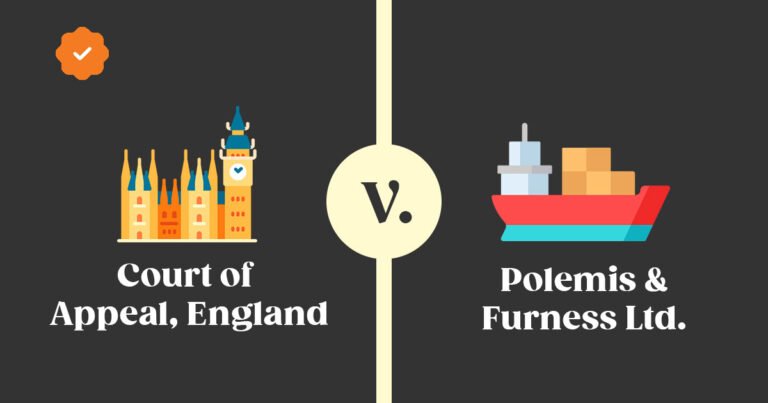Quick Summary
During the unloading process, a wooden board fell into a gasoline container, causing an explosion. The owners accused the charterers of negligence and demanded compensation. The charterers argued that the fire was an unintended consequence of their actions; therefore, they were not liable. The arbitrators concurred with the ship’s owner and determined that the destruction was a remote consequence of negligence.
The issue presented in court was whether the charter was liable for its negligent actions.
The Court of Appeals ruled that the defendant’s irresponsible conduct was his responsibility and that he was liable for all damages in this case.
Rule of Law
As long as the result is caused by someone’s negligence, they can be held accountable for their actions. To prove liability, it is not necessary to exactly predict how the damage or injury would occur.
Facts of the Case
The ship’s owners authorized the appellants (Polemis and Furness, Withy & Co. Ltd.) to transport gasoline and other items to Casablanca on owners’ ship. During the unloading process in Casablanca, a wooden board fell into a gasoline container, causing an explosion. The fire had a catastrophic impact on the ship.
The ship’s owners accused the charterers of negligence and demanded compensation. The response of the charterers was to argue that the fire was an unintended consequence of their actions; therefore, they are not liable.
The arbitrators concurred with the ship’s owner and determined that the ship’s destruction was a remote consequence of negligence. The defendants appealed.
Issue
Did the charterer’s negligence cause the fire? If this is proven to be the case, should he be held accountable for the damages?
Holding and Conclusion
Yes.
It didn’t matter if these effects were judged by opinion or facts.
The Court of Appeals concluded that all of the defendant’s irresponsible conduct was his responsibility and that he was liable for all damages. Appeal dismissed.
Reasoning and Analysis
If someone’s negligence caused an accident, they’re liable. Negligent people never intend to harm others. Instead, their liability stems from careless or thoughtless behavior or failing to act when a reasonable person would have.
Relevant FAQs of this case
What is negligence?
The lack of caution that a reasonable person would have shown in the same situation if they were in your place.
When does an accident create legal liability?
It is the legal notion of “Negligence” in the United States that decides whether or not an individual or organization is legally liable for the damages caused by the accident.
There are some factors of negligence that must be understood before the court reach a conclusion, which include:
- Moral duty to consider consequences before taking any action.
- Failing to exercise reasonable care and judgment.
- Evidence to prove that the action directly contributed to the accident.
- Actual financial, mental or physical injury due to the accident.
Negligence requires a link between the conduct and the harm incurred. If the accident is caused by a rule violation, the offender will be held legally accountable.
Unfortunately, mishaps are common, and in some cases, nobody is at fault. According to the principles of negligence law, legal action is warranted only where an actual loss has been sustained and that loss was preventable with the use of reasonable care and foresight.
What is not an element of negligence?
The accused does not have to have “intent” to be found guilty of negligence. For example, drivers who ignore stop signs don’t always mean to hurt pedestrians when they do. Instead, the driver’s irresponsibility in disregarding traffic regulations is to blame.
References
Was this case brief helpful?
